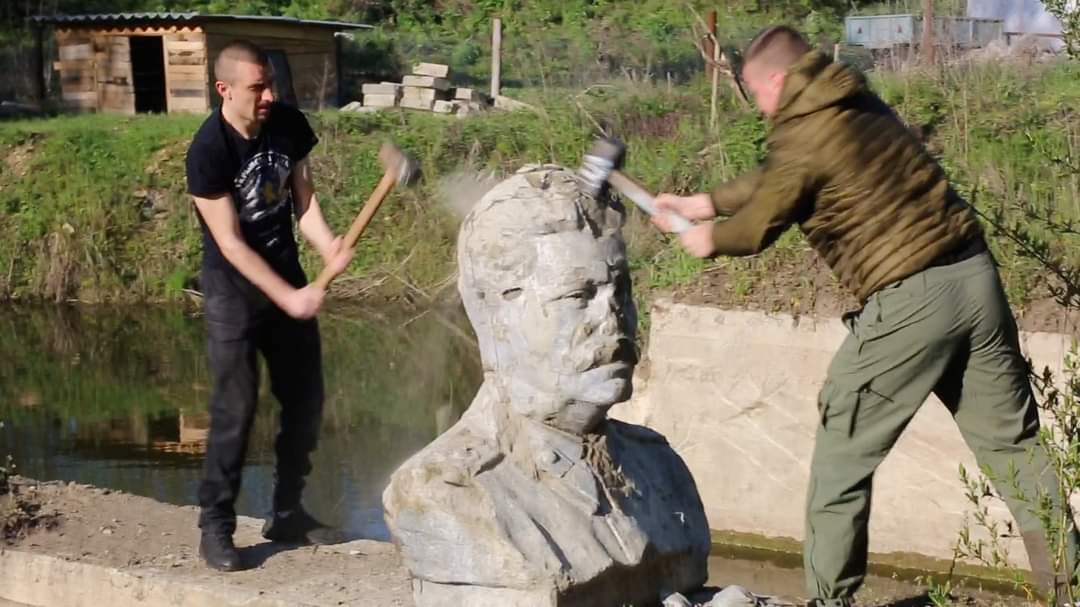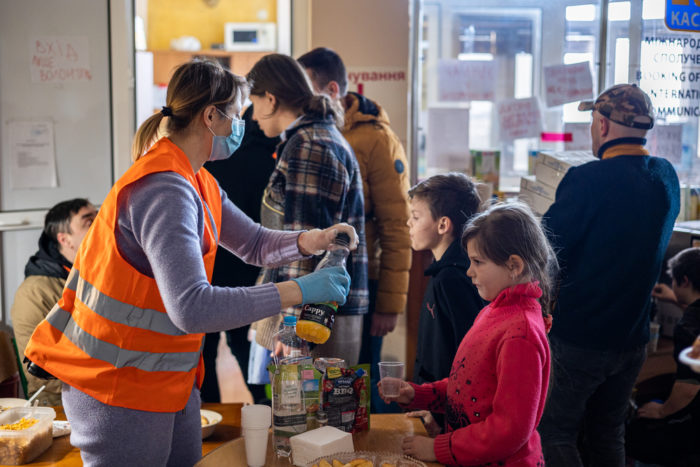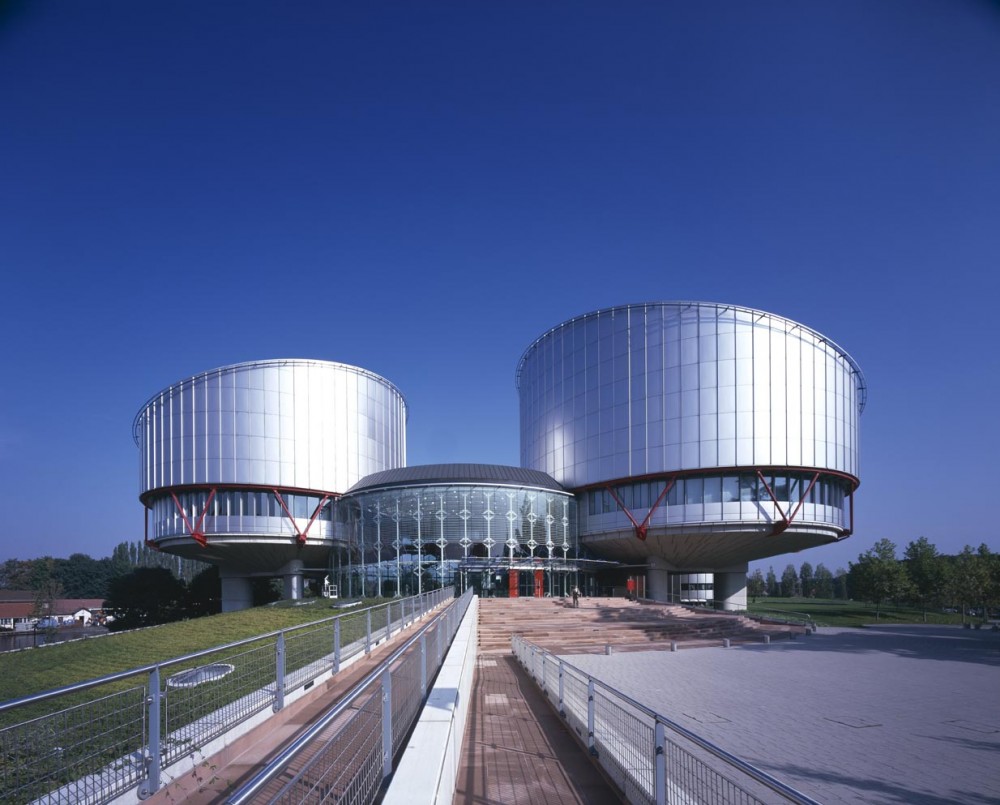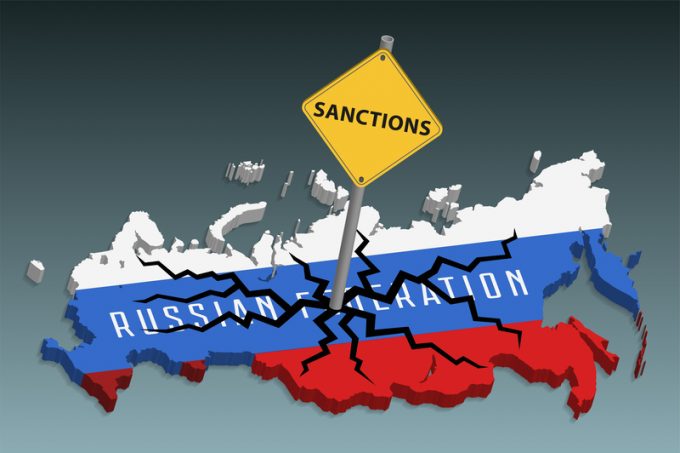As a part of the Tenth national survey during the war, the Sociological Group “Rating” has conducted comprehensive research of the ideological markers of the Ukrainian society. Before May 9, the respondents were asked about the Soviet past, the role and participation of the Ukrainian people in World War II, the national liberation movement, the assessment of historical figures, and about their attitude to the ban on symbols and to the dismantling of monuments. In addition, the issues of nationality, language, and the attitude to various ethnic groups were studied.
The full-scale Russian aggression against Ukraine has significantly affected the perceptions of ideological issues, especially those related to the “shared” Soviet history. The results of many years of observations in Ukraine and Russia confirmed the shift of public opinion in opposite directions regarding the historical past.
An example of this is the rate of nostalgia for the collapse of the USSR: in Russia, it has mostly been increasing over the past ten years (since 2010, this indicator increased from 55% to 63%), while in Ukraine, it decreased (from 46% in 2010 to 11% in 2022). As a result, Ukrainian national heroes and symbols have begun replacing once significant and imposed by Soviet propaganda historical figures. Thus, as of the end of April 2022, the lowest level of nostalgia for the collapse of the USSR over the history of observations was recorded in Ukraine (11%). The vast majority of the respondents – 87% – do not miss the USSR.
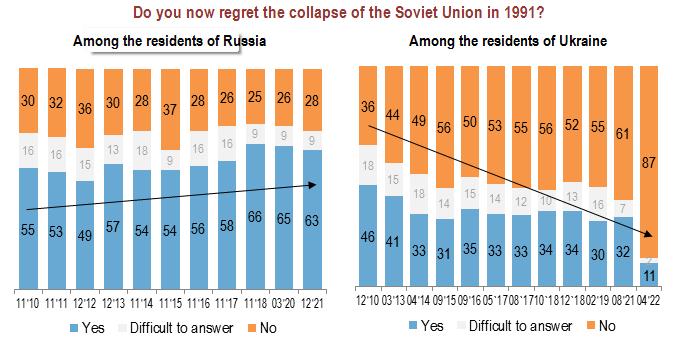

- At the end of February 2022, as a result of Russian aggression, a dramatic change took place in the ideological views of the Ukrainian society on any markers related to Russia. A “decommunization” and “de-Russification” of public opinion happened. Everything “Soviet” is now often perceived as the Russian one, and, consequently, the hostile one. The main reason for this is the use of Soviet symbols and speculations regarding the “common” historical past by Russian propaganda in the war against Ukraine.
- The reassessment of the attitudes towards the May 9 Victory Day is one of the key changes in the historical memory. While before 2022, this holiday was perceived by the absolute majority of the adult population of Ukraine (80%) as the one that has a significant personal symbolism, in 2022, for a considerable share of the respondents it became a relic of the past (36%), or just a regular day (23%).

- In addition, the “victorious” symbolism of this day changed to the “memorial” one. Since 2012, the gradual dynamics of rethinking this date has been recorded. But the war with Russia has dramatically changed the views of Ukrainians, and today, it is a Remembrance Day for 80% of the respondents, and only for 15%, it is a Victory Day (this share was 58% in 2018).
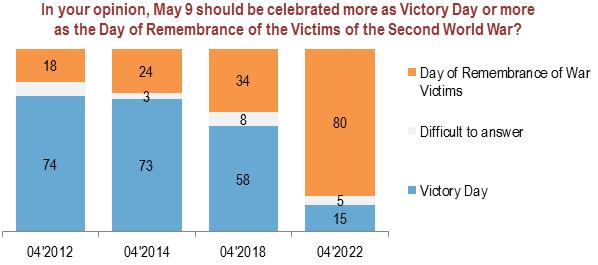
- Despite the change in attitude to the symbolism of the Victory Day, Ukrainians highly appreciate (78%) the contribution of the Ukrainian people to the victory over fascism, and 67% believe that Ukraine was the largest contributor to the victory over Germany in World War II. 23% think it was Russia, 24%, Belarus, and 21%, think it were other countries of the USSR. Regarding the allies, 30% of Ukrainians say the largest contribution was by the United States and 27%, by the United Kingdom.
- The emphasis of the struggle of the Ukrainian people during the war shifted from the pro-Soviet to pro-Ukrainian. While in 2008, 74% of the respondents believed that Ukrainian soldiers and officers in the Soviet army fought for their Soviet homeland, 13% believed they fought for the liberation of Ukraine, and only 3%, for the liberation of Europe, in 2022 the share of those who believe that Ukrainians fought for their land increased to 44%. 39% believe they fought for the Soviet homeland, and 7%, for the liberation of Europe. As in 2008, only 3% believe the Ukrainians fought for Stalin.
- Interestingly, assessing the current Ukrainian-Russian war, three quarters of the respondents believe that Ukrainian soldiers and officers protect both the people of Ukraine and the peoples of Europe today, and only 22% believe that Ukrainian soldiers and officers protect only the people of Ukraine.
- Ukrainians have a positive attitude towards the warriors who defended their homeland from enemies at different times and in different armies. The vast majority (96%) have a positive attitude to the soldiers of the modern Ukrainian army. Also, a positive attitude towards the Soviet soldiers who fought against fascism (85%) and towards the UPA soldiers (71%) dominates in Ukrainian society. And while there still are regional differences in the assessments of the Soviet soldiers and the UPA soldiers, there is a complete consensus across regions and age group on the contemporary soldiers of the Ukrainian army.
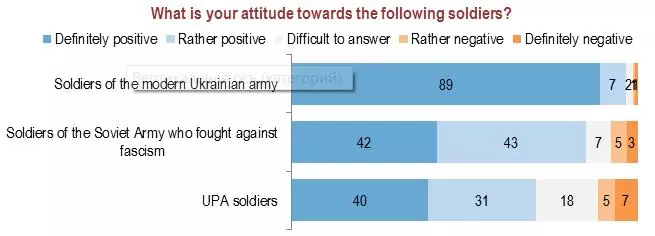
- The support for the recognition of the OUN-UPA as the participants of the struggle for the national independence of Ukraine has significantly increased: 81% support it, and only 10% are against. This support has increased 4 times since 2010, and doubled since 2015.
- Bohdan Khmelnytsky and Mykhailo Hrushevsky are Ukrainian historical figures who are unequivocally positively perceived by Ukrainian society (by more than 90% of the respondents). Over the recent years, there has been a positive trend in the attitude towards Ukrainian historical figures, around which heated debates were going on in Ukrainian society decades ago. In particular, the attitudes that gradually improved are the ones towards Ivan Mazepa (44% in 2012 and 76% in 2022), Simon Petliura (26% in 2012 and 49% in 2022) and Stepan Bandera (22% in 2012 and 74% in 2022). It is important that the positive attitude towards the ideologue of Ukrainian nationalism prevails today in the south-eastern regions of Ukraine, and among those who speak only Russian in everyday life.
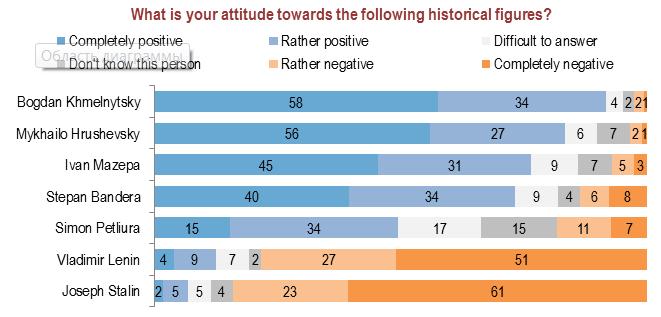
- In contrast, the attitudes towards Soviet leaders have been mostly negative during the last decade, and have deteriorated particularly sharply in 2022. Over the last 5-8 years, the negative attitudes towards Lenin have doubled, and negative attitudes toward Stalin have tripled. Today, only 13% have a positive attitude to Lenin and 7%, to Stalin.
- The absolute majority (89%) of the respondents support the recognition of the actions of Russian troops in Ukraine as the genocide of Ukrainian people. 76% support the ban on the use of symbols Z and V that are marked on Russian military equipment and 74% support for the ban on the “St. George's”K ribbon in Ukraine. It is noteworthy that over the past 5 years, the support for the latter initiative increased from 45% to 74%.
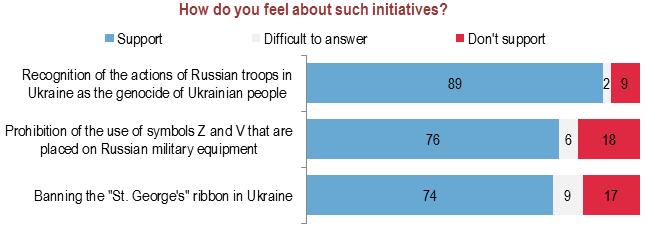
- More than 65% support renaming the streets in Ukraine that have Russian or Soviet names. 71% support dismantling the monuments associated with Russia. 62% think that airing music from Russia on radio and television should be banned. At the same time, the initiative to exclude the works of Russian literature from the school curriculum is controversial (35% support it, 30% do not support it, and 31% are neutral). As for the dismantling of monuments related to the history of the World War II, a relative majority opposes it (40%). 19% support this initiative, while 36% are neutral.
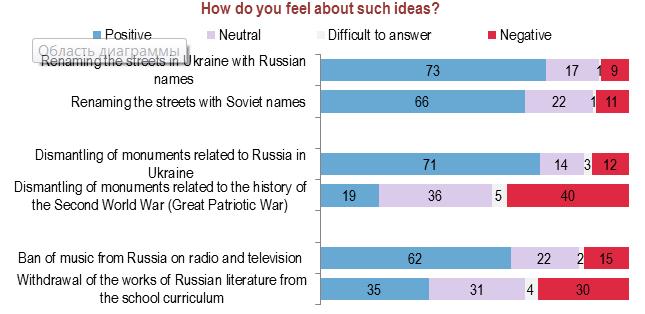
- Dictatorship (41%) and fascism (37%) are the main characteristics used by Ukrainians to describe the current political regime in Russia. Another 10% describe the Russian regime as Nazism.
- Today, 92% of the respondents consider themselves Ukrainians by nationality. 5% consider themselves Russians, and 3% identify as other ethnicities. Interestingly, from 2008 to 2014, there was a stable distribution of ethnic identification: about 83% considered themselves Ukrainians, while about 15%, Russians. After the occupation of Crimea and a part of Donbas in 2014, the number of respondents who identified as Russians decreased to 11%, and the number of those who identified as Ukrainians increased to 87%-88%. At the same time, the share of those who considered themselves Russians has been gradually declining over the past eight years.
- Our studies of the attitudes towards various ethnic and linguistic groups living in Ukraine showed that the respondents’ attitudes towards them are mostly positive or neutral that lean positive. Ukrainians have the best attitude towards Ukrainian-speaking Ukrainians (95% expressed positive attitude) and Russian-speaking ones (57% have positive attitude, 30%, neutral one, and 13%, negative one). Positive attitudes also prevail towards Jews (60%) and Hungarians (49%) living in our country.
- When the war has already started, the attitudes towards Russians who live in Ukraine as well as the one towards the residents of the occupied Crimea and the residents of so-called “DNR/LNR” territories have deteriorated.
- 41% have a positive attitude towards the residents of the occupied Crimea, 14% have a negative attitude, and 40% have a neutral one. 30% have a positive attitude towards the Russians who live in Ukraine, while 27% have a negative one, and 39%, a neutral one. 27% expressed positive attitude to the residents of so-called “DNR/LNR” territories, while 31% expressed a negative one, and 37%, a neutral one.
- Ukrainians have much better attitude towards the residents of Belarus than towards the residents of Russia, although both categories have lost much of their credibility during the war.
- Only 22% of the respondents have positive attitude towards the residents of Belarus (this share has shrunk three times over the year). 33% have negative attitude, and 42%, a neutral one. On the other hand, a negative attitude prevails regarding the residents of Russia: 69%. 8% have positive attitude towards them (this share has shrunk more than three times over the year), and 20% have a neutral attitude.
- Thus, over the last year the attitude towards the residents of Belarus, the residents of the so-called “LNR/DNR” territories and the occupied Crimea shifted from a rather positive one to a more neutral one. Instead, the attitudes toward the residents of Russia have significantly deteriorated, while the attitudes towards Russian-speaking Ukrainians have improved.
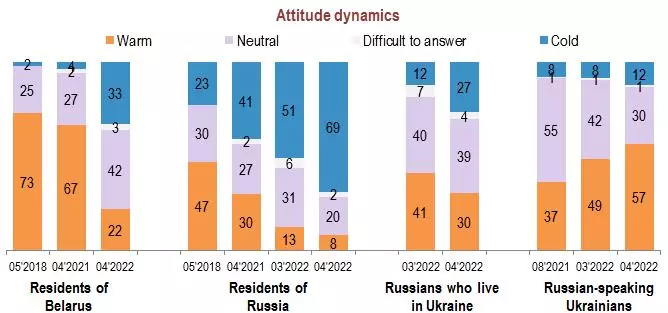
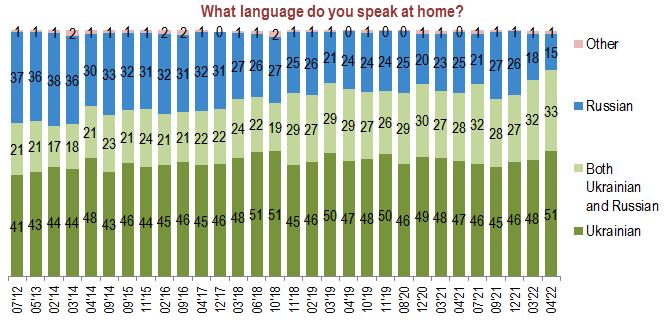
- 80% of the respondents consider Ukrainian their native language, 16%, Russian, and 3%, another language.
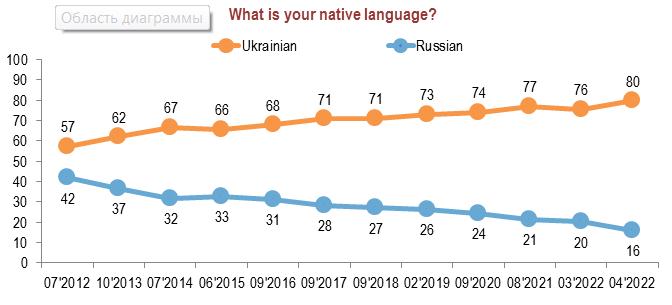
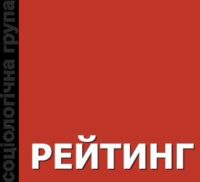 Sociological Group “RATING”
Sociological Group “RATING”
01010, Kyiv, 3 Ivana Mazepy Str., office 3
(+380 98) 575-7020
(+380 98) 937-4288
http://ratinggroup.ua/ [email protected]
Related:
- Ukraine calls on Doctors Without Borders to evacuate Mariupol defenders
- Hunting fascism in Ukraine, you overlooked fascism in Russia
- Ukrainians report over 400 cases of rape and other forms of sexual abuse by Russian troops
- More Ukrainians returning to work: sociological survey
- Financing Putin’s war: Russian coal and gas exports to EU grow despite sanctions

